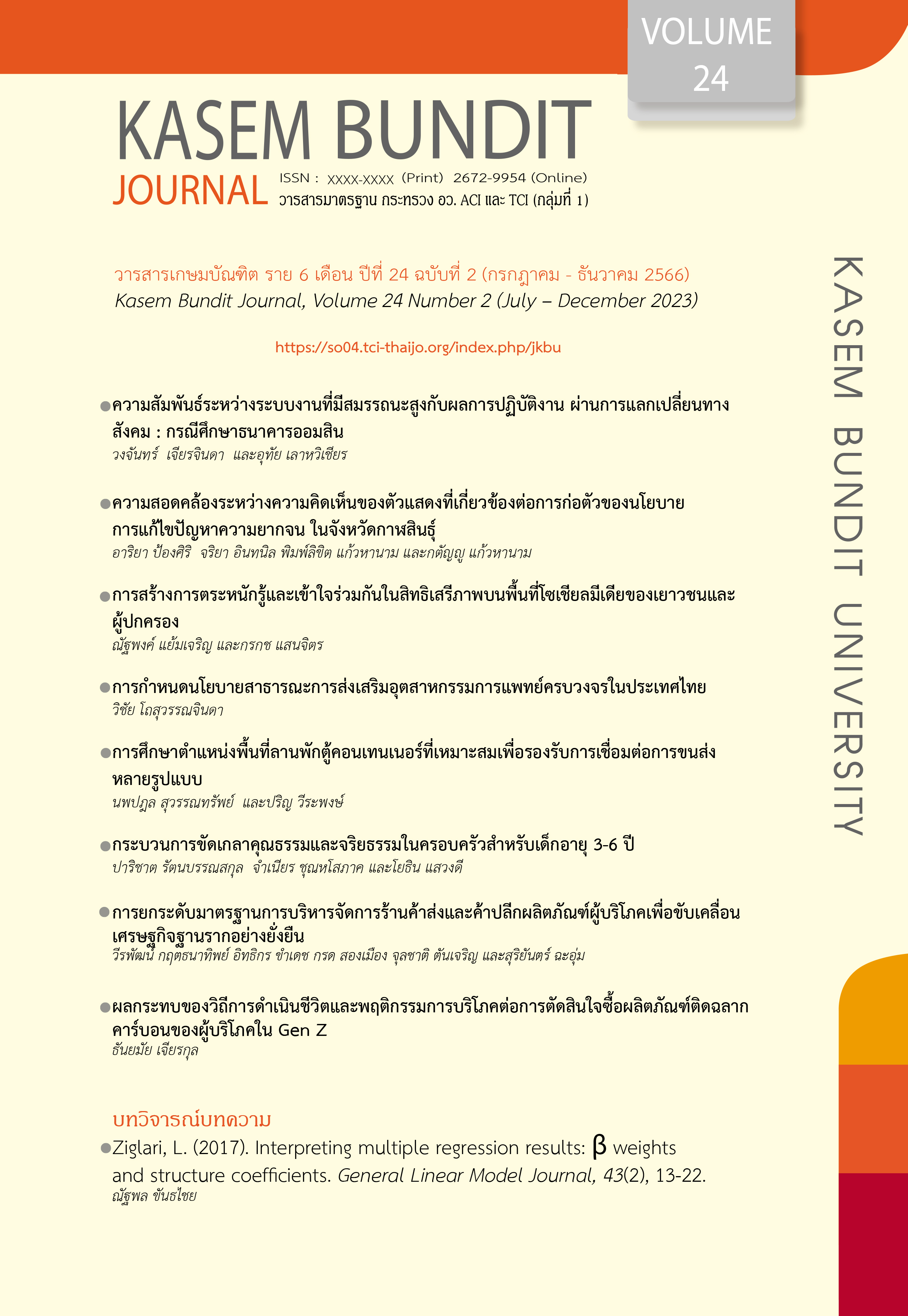ผลกระทบของวิถีการดำเนินชีวิตและพฤติกรรมการบริโภคต่อการตัดสินใจซื้อผลิตภัณฑ์ติดฉลากคาร์บอนของผู้บริโภคใน Gen Z
Keywords:
รูปแบบการดำเนินชีวิต , พฤติกรรมการบริโภค , แนวโน้มพฤติกรรมการตัดสินใจซื้อ , ผลิตภัณฑ์ติดฉลากคาร์บอน เจนซี (Gen Z)Abstract
วัตถุประสงค์ เพื่อศึกษาปัจจัยด้านรูปแบบการดำเนินชีวิตเกี่ยวกับภาวะโลกร้อนและพฤติกรรมการบริโภคผลิตภัณฑ์เพื่อการอนุรักษ์สิ่งแวดล้อมที่ส่งผลต่อแนวโน้มการตัดสินใจซื้อผลิตภัณฑ์ติดฉลากคาร์บอนของผู้บริโภค Gen Z วิธีการวิจัย โดยใช้การวิจัยเชิงปริมาณ โดยการใช้แบบสอบถาม จำนวน 270 ชุด ใช้การสุ่มตัวอย่างแบบบังเอิญ ใช้สถิติในการวิเคราะห์ข้อมูลคือ ความถี่ ร้อยละ ค่าเฉลี่ย ส่วนเบี่ยงเบนมาตรฐาน การวิเคราะห์การถดถอยพหุคูณ ผลการวิจัย ผู้ตอบแบบสอบถามส่วนใหญ่อาศัยอยู่ภาคกลาง ร้อยละ 80 เป็นเพศหญิง ร้อยละ 56.7 อายุ 15-20 ปี ร้อยละ 65.2 การศึกษาระดับปริญญาตรี ร้อยละ 85.9 รายได้ต่ำกว่าหรือเท่ากับ 10,000 บาท ร้อยละ 77.00 ผลการทดสอบสมมติฐาน พบว่า ปัจจัยรูปแบบการดำเนินชีวิตเกี่ยวกับภาวะโลกร้อนและพฤติกรรมการบริโภคผลิตภัณฑ์เพื่อการอนุรักษ์สิ่งแวดล้อมส่งผลต่อแนวโน้มการตัดสินใจซื้อสินค้าติดฉลากคาร์บอน อย่างมีนัยสำคัญ นัยทางทฤษฎี/นโยบาย ผู้ประกอบการสามารถนำผลที่ได้จากการวิจัยไปประยุกต์ใช้เป็นแนวทางในการพัฒนาผลิตภัณฑ์ติดฉลากคาร์บอน ให้สามารถตอบสนองความต้องการของผู้บริโภค Gen Z ในยุคใหม่ได้ดียิ่งขึ้น
References
Axon, S. (2017), Keeping the ball rolling: addressing the enablers of and barriers to sustainable lifestyles, Journal of Environmental Psychology, 52, 11-25.
Basha, M.B. and Lal, D. (2019), Indian consumers’ attitudes towards purchasing organically produced foods: an empirical study, Journal of Cleaner Production, 215, 99-111.
Blasi, S., Brigato, L., & Sedita, S.R. (2020). Eco-friendliness and fashion perceptual attributes of fashion brands: An analysis of consumers’ perceptions based on twitter data mining, Journal of Cleaner Production. 24(4).
Carbon Disclosure Project (2011), CDP Global 500 Report 2011: Accelerating Low Carbon Growth, https://www.demant.com//media/demant/main/mediadocuments/responsibility/carbon-disclosure-project-2011.pdf.
Delmonico, D., Jabbour, C.J.C., Pereira, S.C.F., Jabbour, A.B.L.D.S., Renwick, D.W.S., & Thome, A.M. T. (2018), Unveiling barriers to sustainable public procurement in emerging economies: evidence from a leading sustainable supply chain initiative in Latin America, Resource Conservation and Recycling, 134, 70-79.
Ebbs, S. (2019), “5 of the biggest environmental and climate change stories over the last decade and what’s changed, https://abcnews.go.com/US/biggest-environmentalclimate-change-stories-decade-whats-changed/story?id566765643.
Firamadhina, F.I.R., & Krisnani, H. (2021), Perilaku generasi Z terhadap penggunaan media social tiktok: TikTok sebagai media edukasi dan aktivisme, Share: Social Work Journal, 10(2), 199, doi: 10.24198/share.v10i2.31443.
Gonzalez, C., Korchia, M., Menuet, L., & Urbain, C. (2009), How do socially responsible consumers consider consumption? An approach with the free associations method, Recherche et Applications en Marketing (English Edition), 24(3), 25-41.
Helaluddin, H., Tulak, H., & Rante, S.V.N. (2019), Strategi pembelajaran bahasa bagi generasi Z: sebuah tinjauan sistematis, Journal Pendidikan Edutama, 6(2), 31.
Hofenk, D., van Birgelen, M., Bloemer, J., & Semeijn, J. (2019). How and when retailers’ sustainability efforts translate into positive consumer responses: the interplay between personal and social factors, Journal of Business Ethics, 156(2), 473-492.
Hoffmann, S., Mai, R., Lasarov, W., Krause, W., & Schmdit, U. (2019). Hungry bellies have no ears. How and why hunger inhibits sustainable consumption., Ecological Economics, 160, 96-104.
Jaiswal, D., & Kant, R. (2018), Green purchase behaviour: a conceptual framework and empirical investigation of Indian consumers, Journal of Retailing and Consumer Services,51, 60-69.
Kumar, A., Prakash, G., & Kumar, G. (2020), Does environmentally responsible purchase intention matter for consumers? A predictive sustainable model developed through an empirical study, Journal of Retailing and Consumer Services, 58, (10),
doi: 10.1016/j.jretconser.2020.102270.
Kumar,R., Saha, S., P.C., S., & Dahiya, R. (2019). Examining the role of external factors in influencing green behaviour among young Indian consumers. Young consumers. 20(4), 380-398. DOI 10.1108/YC-12-2018-0921
Maichum K, Parichatnon S, Peng K-C. (2016). Application of the extended theory of planned behavior model to investigate purchase intention of green products among thai consumers. Sustainability. 8: 1077. https://doi.org/10.3390/su8101077
Munerah, S., Koay, K.Y. and Thambiah, S. (2021), “Factors influencing non-green consumers’ purchase intention: a partial least squares structural equation modelling (PLS-SEM) approach”, Journal of Cleaner Production, 280, 124192.
Nasution, E.Y., & Kurnia, E. (2021), Perilaku konsumen gen Y dan gen Z dalam pengambilan keputusan pembelian, Studi Komparatif Japanese Food Dan American Food’, 21(1), 64-75.
Nguyen, T.T.M. (2019), An investigation into the relationship between materialism and green purchase behavior in Vietnam and Taiwan, Journal of Economics and Development, 21(2), 247-258, doi: 10.1108/JED-10-2019-0044.
Nguyen, Y.T.H., & Nguyen, H.V. (2020), An alternative view of the millennial green product purchase: the roles of online product review and self-image congruence, Asia Pacific Journal of Marketing and Logistics, 33(1), 231-249, doi: 10.1108/APJML-10-2019-0612.
Patanadul, P., & Jadesadalug, V. (2016). Factors Affecting Purchase Intention of Eco-Products Among Consumers in Pak Kret Area, Nonthaburi Province. Veridian E-Journal, Silapakorn University, 9(2), 857-872.
Quoquab, F., Mohammad, J., & Sukari, N.N. (2019), A multiple-item scale for measuring ‘sustainable consumption behaviour’ construct: development and psychometric evaluation, Asia Pacific Journal of Marketing and Logistics, 31(4), 791-816.
Roser-Renouf, C., Atkinson, L., Maibach, E., & Leiserowitz, A. (2016), Climate and Sustainabilityj the consumer as climate activist, International Journal of Communication, 10, 4759-4783.
Schlossberg, M. (2016). Teen generation Z is being called ‘millennials on steroids. http://uk.businessinsider.com/millennials-vs-gen-z-2016-2.
Sobuj, M.d., Khan, A.M., Habib, M.d.A., & Islam, M.d.M. (2021). Factors influencing eco-friendly apparel purchase behavior of Bangladeshi young consumers: case study. RJTA. 25: 139–157. https://doi.org/10.1108/RJTA-10-2019-0052
Tan, C.N.L, Ojo, A.O., & Thurasamy, R. (2019). Determinants of green product buying decision among young consumers in Malaysia. Young consumers. 20(2), 121-137.
Thailand Environment Institute (2017). Guide to certification of reducing or avoiding greenhouse gas emissions. Institute.
Townsend, S. (2018), 88% of consumers want you to help them make A difference,: https://www.forbes.com/sites/solitairetownsend/2018/ 11/21/consumerswant-you-to-help-them-make-a-difference (accessed 23 December 2019).
Valet, V. (2019), The world’s most reputable companies for corporate responsibility 2019, https://www.forbes.com/sites/ vickyvalet/2019/09/17/the-worlds-most-reputable-companies-for-corporate-responsibility-2019/.
Wong, M.C. (2021), Does corporate social responsibility affect generation Z purchase intention in the food industry, Asian Journal of Business Ethics, 10(2), 391-407.
Yoon, S., Kim, Y., & Baek, T.H. (2016), Effort investment in persuasiveness: a comparative study of environmental advertising in the United States and Korea, International Journal of Advertising, 35(1), 93-105.
ZAP Clinic (2021), Zap beauty indie, www.zapclinic.com.
Zis, S.F., Effendi, N., & Roem, E.R. (2021), Perubahan perilaku komunikasi generasi milenial dangenerasi Z di era digital, Satwika: Kajian Ilmu Budaya Dan Perubahan Sosial,5(1), 69-87.
Downloads
Published
How to Cite
Issue
Section
License
Copyright (c) 2023 KASEM BUNDIT JOURNAL

This work is licensed under a Creative Commons Attribution-NonCommercial-NoDerivatives 4.0 International License.
ทัศนคติ ความคิดเห็นใด ๆ ที่ปรากฏในวารสารเกษมบัณฑิตฉบับนี้เป็นของผู้เขียน โดยเฉพาะ มหาวิทยาลัยเกษมบัณฑิตและบรรณาธิการ ไม่จำเป็นต้องมีความเห็นพ้องด้วย







